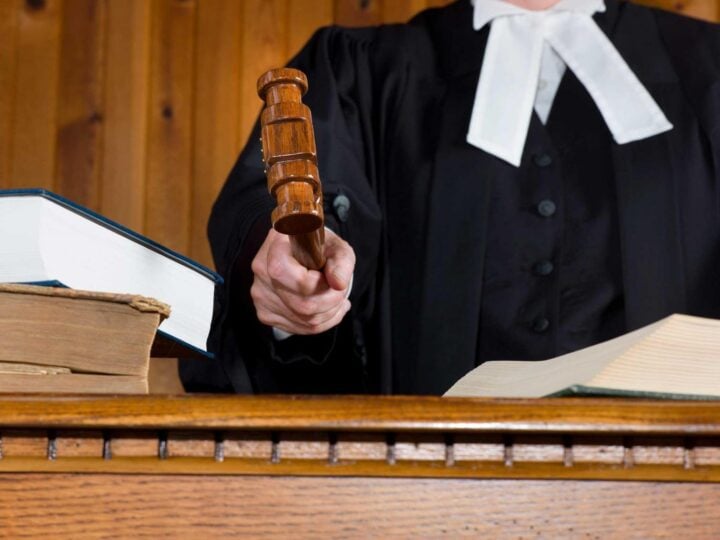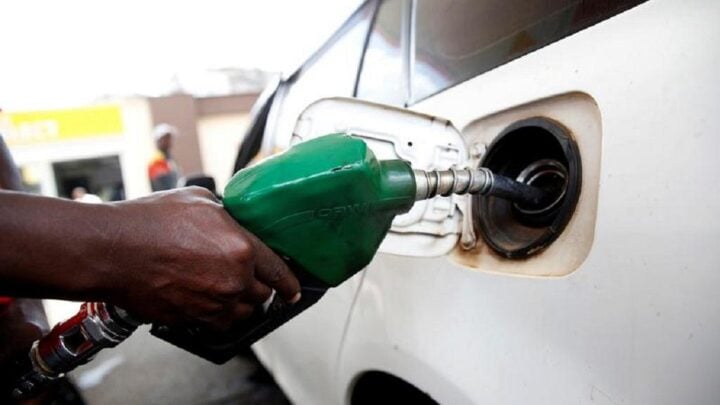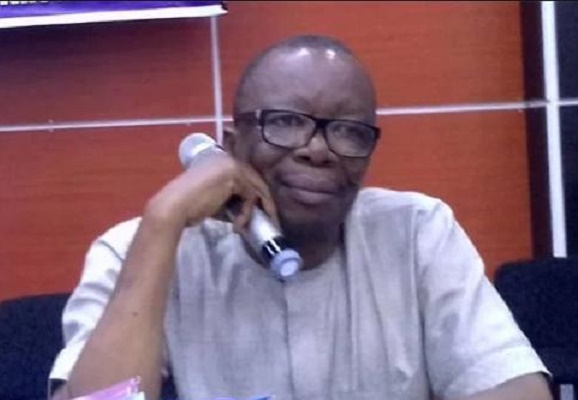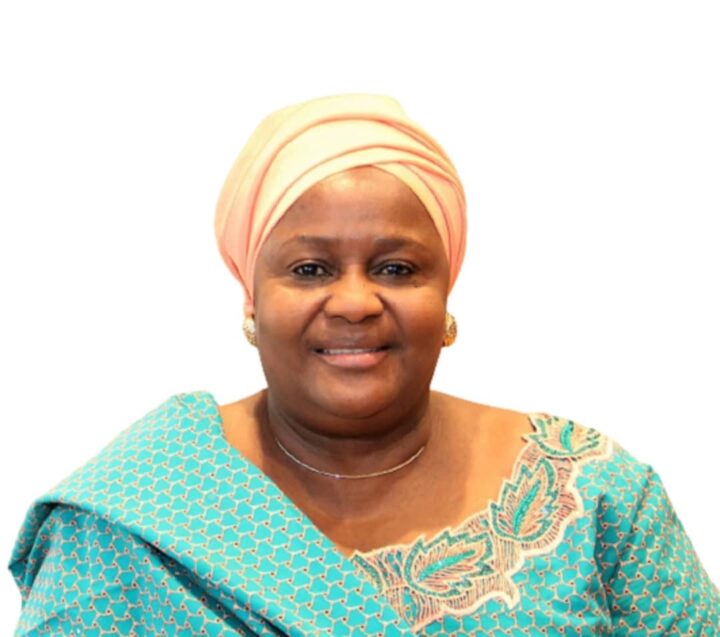Aliyu Abubakar, the property developer, has told a federal high court sitting in Abuja that the Economic and Financial Crimes Commission (EFCC) asked him to implicate former President Goodluck Jonathan and Mohammed Bello Adoke, former attorney-general of the federation, in money laundering.
Speaking under cross examination on Tuesday in the “trial within trial”, Abubakar said Bala Sanga, then-EFCC prosecutor, asked him on December 31, 2019 to claim that he gave Adoke $20 million and Jonathan $50 million “so that I would not be detained into the new year”.
He said he was then forced to sign a prepared statement with the threat that he would be detained on the orders of Ibrahim Magu, who was the EFCC chairman at the time, if he did not cooperate with the agency.
On August 4, 2020, the EFCC had arraigned Adoke (1st defendant) and Abubukar (2nd defendant) before Justice Inyang Ekwo on allegations of money laundering.
Advertisement
The agency alleged that Adoke made a cash payment of $2,267,400 to Unity Bank in 2013 in contravention of money laundering laws.
Adoke , in his memoir, said Abubakar had in 2011 offered him a property for N500 million out of which Unity Bank provided a mortgage of N300 million, which was then equal to about $2.2 million.
He said when he could not raise the funds to pay his equity contribution of N200 million, Abubakar refunded the mortgage to Unity, repossess the property and sold it to the Central Bank of Nigeria (CBN) in 2013.
Advertisement
Abubakar refunded the N300 million directly to Unity Bank, Adoke wrote.
However, EFCC’s star witness, Rislanudeen Mohammed, who was the acting MD of Unity Bank when Abubakar refunded the mortgage in 2013, told the court that there was no money laundering involved in the transaction, insisting that it was “transparent and legitimate”.
Although the case before the federal high court does not mention the controversial OPL 245 deal, the EFCC is using the same particulars to prosecute Adoke, Abubakar and others in an FCT high court this time over the oil block.
WHAT TRANSPIRED COURT?
Advertisement
On Tuesday, the trial before Ekwo continued with a new prosecutor, Ofem Uket, taking over after the withdrawal of Sanga.
Abubakar is presented by Wole Olanikpekun while Adoke’s team, led by Kanu Agabi, has been joined by Victor Ndoma Egba and Aliyu Sarki. All are senior lawyers.
The first witness called by the 2nd defendant was Abubakar.
Here is the text of the proceedings.
Advertisement
Olanikpekun: You were in court on 9/5/22 when DW1 showed the court the interview (of Abubakar’s interrogation by EFCC). How long do they usually take?
Abubakar: Two to three hours.
Advertisement
Olanikpekun: What format did it take?
Abubakar: Once we get there, the EFCC will ask verbally what happened about the case before they ask to put it in writing. There is a conference room in that place.
Advertisement
Olanikpekun: On 6/12/21 you were in court and the prosecution wanted to render some statements which your lawyer objected to. Can you please give us the statement of 6/8/15 and 30/8/15. Can you tell my lord where those statements were made, the venue…
Abubakar: The head office of EFCC in Wuse 2.
Advertisement
Olanikpekun: Was your lawyer present for the statement?
Abubakar: No.
Olanikpekun: Who were there?
Abubakar: It was Ibrahim (the IPO)
Olanikpekun: Were you released on administrative bail after making the statement?
Abubakar: Yes.
Olanikpekun: Statements of 16/1/16 and 17/1/16, where were they made?
Abubakar: At the Wuse 2 office, their headquarters.
Olanikpekun: When you were invited on 16/1/16 to make the statement, what happened?
Abubakar: I was invited on the date, we were in the conference room, I met Ibrahim the IPO, Aminu, Babangida and they said they want me to make additional statements and I told them I have said what I know about the case. They said there is a new development and I need to make another statement. I told them I have nothing more to say and they asked me to wait and after a while they said if I cannot write, they will write for me. I said I can write but I don’t have what to say and they later came back and said if I don’t write, they have the orders of the chairman to detain me. That’s how Bashir (EFCC investigator) wrote for me and I signed. And they later came back and said the chairman said they should let me go.
Olanikpekun: Can you look at the beginning of the statement where it was written: “I have been duly cautioned in English language”. Whose handwriting is that?
Abubakar: It’s Bashir.
Olanikpekun: So, it was after that you were told to put your name and signature?
Abubakar: Yes
Olanikpekun: At what point?
Abubakar: After the statement had been written.
Olanikpekun: What did you do when you were asked to sign?
Abubakar: I said I didn’t understand and he didn’t read it to me.
Olanikpekun: Did you complain and protest?
Abubakar: Yes sir.
Olanikpekun: What did he say?
Abubakar: He said if I didn’t sign the statement, he will detain me.
Olanikpekun: Did you see the part where it says you cannot write for another?
Abubakar: Yes sir.
Olanikpekun:: Show him the statement of 17/1/16 where it says you cannot write for another. If you look at the opening portion of this statement, who wrote, put the narratives there.
Abubakar: It’s Bashir.
Olanikpekun: At what point did they ask you to put your name?
Abubakar: After they have written the statement.
Olanikpekun: Did you protest?
Abubakar: Yes sir, I did the same thing.
Olanikpekun: Statement of 31/12/19. Can you tell the court how you got to EFCC on 31/12/19?
Court: The proper thing will be to ask what he has to say about that statement and he will tell me what he knows about it.
Abubakar: On the 31/12/19, my lawyer came to me in my house and said one Ibrahim called him that they need clarification and they want him to bring me to EFCC. I agreed and followed him.
Olanikpekun: What is the name of the lawyer?
Abubakar: Ahmed Audu. While we were there, Ibrahim, Aminu, Babangida and others who I cannot remember came in and demanded I make an additional statement, that things have changed and someone will internment. After that time, one man came in and told all of us seating down in the conference room that his name is Bala Sanga and he is the new prosecutor in the case. He thanked me and asked for my cooperation and he will help if I cooperate. Bala asked questions which I answered and he asked my lawyer to write for me and I said I had nothing more to say and Bala said: “Alhaji, you are to cooperate with us and if you don’t, we will detain you.” Then Ahmed said: “This is December and you do not want to spend the next day in the cell?” (The next day was New Year). So, I asked Ahmed what I should do and he said he will write it and after some persuasion, I agreed.
Olanikpekun: Have you ever seen Bala in this court?
Abubakar: Yes sir.
Olanikpekun: How did you meet him?
Abubakar: He is the prosecutor and the one that investigated me.
Olanikpekun:: Look at you last statement of 6/1/2020. Can you tell my lord how that statement came about?
Abubakar: That day, Ahmed and I went to EFCC and they asked us to come the second or third they and they (Bala, Aminu and others were there) asked us to write the statement.
Olanikpekun: Please tell the court what transpired.
Abubakar: While I was in their office, Bala called me and said he wants to help me. He asked how close I am to Adoke and I said he is my brother. He said I have to sacrifice someone to be alive and that there is evidence before him which he will show me at the right time that he has information that I gave Adoke USD20 Million. I said how did I carry it? As I did not. He said I think Adoke is my brother from the same place and I don’t want to say the truth. I said there is nothing like that as he wants me to implicate someone with lies. He also said there is evidence before him that I gave President Goodluck Ebele Jonathan USD 50 Million and I said there is nothing like that. He said that if I don’t cooperate with him, he will charge me to court and he wanted to make me a witness against them (Adoke and Jonathan).
Olanikpekun: You were in court on 9/5/22 when PW8 on his own said nobody asked you to implicate anybody. Did you hear him?
Abubakar: Yes, I did.
Olanikpekun: What do you say to that?
Abubakar: It’s a lie. I was asked to implicate Adoke or former President Jonathan.
At this point, the examination-in-chief for this witness was concluded.
Court: Uket, are you proceeding to cross examine?
Uket: Yes.
Court: How long?
Uket: 25 to 30 minutes.
Agabi: You said Bala asked you to implicate Adoke. Who is he?
Abubakar:: The former attorney-general.
Agabi: Is he in this court?
Abubakar: Yes sir.
Adoke got up and Abubakar identified him.
Cross examination of Abubakar by Uket, the EFCC prosecutor
Uket: You are involved in business.
Abubakar: Yes sir
Uket: By the nature of the business you do, you are always represented by lawyers
Abubakar: Yes sir.
Uket: Your first statement was made on 5/8/16. Was that freely?
Abubakar: No sir.
Uket: Were you cautioned?
Abubakar: I don’t know the meaning of caution.
Uket: The statement of 6/8/15 was based on a request from Milan and was a free statement. The statement of 5/8/15 unlike the other statements was made without you being cautioned.
Abubakar: Yes, there is no caution here.
Uket: When you made the statement, you were accompanied by Barrister Peter Aliyu?
Abubakar: No, I was not. It was when I was delayed after the statement that Peter came.
Uket: Let’s go to the statement made on 16/1/16. You were first interviewed before the statement was recorded in the presence of your lawyer.
Abubakar: That’s not correct.
Uket: The cautionary word was displayed and you made the statement after that, then asked to fill your name and particulars. Now after being cautioned and you signed the cautionary word.
Abubakar: That’s not true, sir.
Uket: The signature under the word of caution is your signature.
Abubakar: Yes sir.
Uket: It was after that signature you volunteered your statement?
Abubakar: No.
Court: You cannot muscle him to answer what you want. If he has an explanation after the statement, he can explain.
Uket: The two signatures at the end, are they yours?
Abubakar: Yes, there were signed after the statement had been made.
Uket: Statement of 17/1/16 — before you made this statement, you were interviewed and after the word of caution was administered, you made the statement.
Abubakar: I am getting confused.
Uket: You wrote your name in that word of causation and signed the signature after they said they will take you to court.
Abubakar: Yes.
Uket: At the end of the statement, you have two signatures.
Abubakar: Yes.
Uket: Immediately after the statement, who signed that?
Abubakar: That is my signature.
Court: The point is not whether he signed. You know what we are looking for here.
Uket: I suggest to you that at no time when you wrote the statements of 16 and 17/ 1/16 were you ever threatened or forced to make the statement.
Abubakar: That is not true, sir.
Uket: I also suggest to you that you never protested.
Abubakar: Mr Uket, that is not true, sir.
Uket: You said you protested, who did you report to?
Abubakar: How can I report to anybody when I am in EFCC?
Uket: The statement of 16 and 17/ 1/16 were made before Mr. Adoke returned to Nigeria.
Abubakar: I can’t remember.
Uket: Let’s go to the statement of 31/12/16. You were invited to make that statement after Adoke returned to Nigeria.
Abubakar: I don’t know.
Uket: MBA returned to Nigeria on 19/12/19
Abubakar: OK.
Uket: Before you made that statement, you were accompanied by your lawyer.
Abubakar: That is what they said.
Uket: There is a video that showed the proceedings and you and Ahmed were conferring while making the statement.
Abubakar: No sir.
Uket: Was there any portion of the video where you protested to the statement?
Abubakar: The video was showing me and Ahmed and not everything.
Court: You should know when to make a point and your conclusion.
Uket: I suggest to you at no time did Bala Sanga ask you to implicate Adoke.
Abubakar: Sir, that day you watched the video, he was talking in the background.
Uket: Did you hear anything where Mr. Sanga asked you to implicate Aoke?
Abubakar: The part that I saw tells me that I saw Sanga face to face.
Court: That video was played and all persons involved watched it. It is evidence admitted in the court. You don’t have to make it a part of your burden.
Uket: Throughout the recording of the statement of 31/12/17, your lawyer never advised you to stop writing the statement.
Abubakar: I told you that Ahmed protested that he will not write the statement.
Uket: Did Ahmed stop you?
Abubakar: When they were asking me questions, Ahmed wrote and I was talking.
Uket: The point is that Ahmed recorded that statement. The point is that if Ahmed saw an issue, he would not have advised you to continue taking that statement. Now, let’s go to the statement of 6/1/20 where you suggested that Bala Sanga called you aside and said someone has to be sacrificed. I suggest to you that Bala never discussed that with you.
Abubakar: He did and that’s why when I came to the court this morning, I did my ablution and I swore with the Quran. I did not manufacture that.
Uket: I also suggest to you that Bala did not say anything about the monies to Adoke or Jonathan.
Abubakar: He did. He said he has evidence.
Uket: I also suggest to you that each of those statements were made voluntarily.
Abubakar: That’s not true sir, no sir
The 2nd witness, Ahmed Audu, was called.
Olanipekun: You are a legal practitioner. Do you know the 2nd defendant (Abubakar)
Audu: Yes.
Olanipekun: What’s the relationship?
Audu: I work for him as a lawyer.
Olanipekun: To be of assistance to you, can you look at the statements of 31/12/19 and 6/1/20 which are already before this court. Who wrote them?
Audu: I wrote them.
Olanipekun: Tell the court how you came about going with him to the EFCC on those dates and what happened that led to the statements on 31/12-19.
Audu: This was after Ibrahim Ahmed (the investigator) called me during Christmas period and I informed Alhaji of the investigation on the 29/30 and he obliged. I met Ibrahim, Abdulahi and one Babangida and about five of them whose names I can’t remember now. While we were talking, one Bala Sanga came in who was introduced as the new prosecutor in the matter. He said “I took over from Aliyu Yusuf and we need your cooperation”. I said do they want more statements and I eventually agreed that I’ll write what he says. I complained to Ibrahim and while we were there, Magu came in and they left the conference room. Then I heard Magu say “if he does not cooperate, detain him”. I went to Ibrahim who said: anything he said you should do, do it. So, I asked if I could do it in my language and he said no. Then, I told my client that we should do whatever they want so we can leave.
That 31st of December 2019 was a Friday and if he didn’t do anything, they will not release him. They finally left at about 7.30pm. After writing the statement, Abubakar refused to sign and there was the same threat of detention and he eventually signed.
Olanipekun: On 6/1/20, were the same people there?
Audu: Yes, Sanga was the one that led the interview.
This concludes the examination in chief of this witness.
Cross Examination
Uket: Mr. Ahmed, how long have you been working for Abubakar as a lawyer?
Audu: It’s over 5 years
Uket: You are aware that he made a statement under caution on 16/1/16?
Audu: Yes.
Uket: When he made that statement, you and Peter Aliyu accompanied him?
Audu: Yes.
Uket: And he was released on bail?
Audu: Yes.
Uket: And when he went back, he was still on bail?
Audu: Yes
Uket: On 31/12/19 when he was invited
Court: can you clarify a point for me: verify the point accompanying and staying with him when he made the statements.
Uket: It was based on the familiarity and friendship with the IPO that he told you upfront to come and make the statements.
Audu: I can’t say it’s because of the friendship.
Uket: And you accompanied your client in your official capacity as his lawyer.
Audu: Yes.
Uket: And in your presence, the cautionary words were explained to him.
Court: After he has answered your question, he is allowed to make explanations. You do not have a case with me. I am only telling you how to do it well.
Uket: That statement of 31/12/19, you helped Abubakar record it.
Audu: Yes, I did because he refused to record it.
Uket: I believe in the course if recording, you and Abubakr were conferring while recording.
Audu: No.
Uket: I suggest to you that at no time did the chairman rant to say if Abubakar did not make statements he should not be on bail.
Audu: For the record, thank God you (Uket) were there that day.
Uket: No no no, Mr. Ahmed. You, never, never,
Court: Are now under cross examination: be confident that the court will sift that which is not relevant?
Uket: I suggest to you that Alhaji’s bail granted in 2016 was never revoked or threatened to be revoked.
Audu: I do not know. I was only told that it’s what they wanted that we will do.
Uket: You went to represent your client as a lawyer. Were you personally threatened
Audu: I brought someone that was threatened.
Uket: Were you threatened?
Audu: Yes.
Uket: As a professional who went to represent your client, was it not your duty to protect him?
Court: What kind of question is that?
Uket: I suggest to you that at no time was your client threatened that if he didn’t make statements, he will be detained.
Audu: Were you there?
Uket: I suggest to you that at no time did the EFCC chairman threaten your client?
Audu: He did.
The case was adjourned till September 28, 2022 for parties to deliver their written address to conclude the trial within trial.






